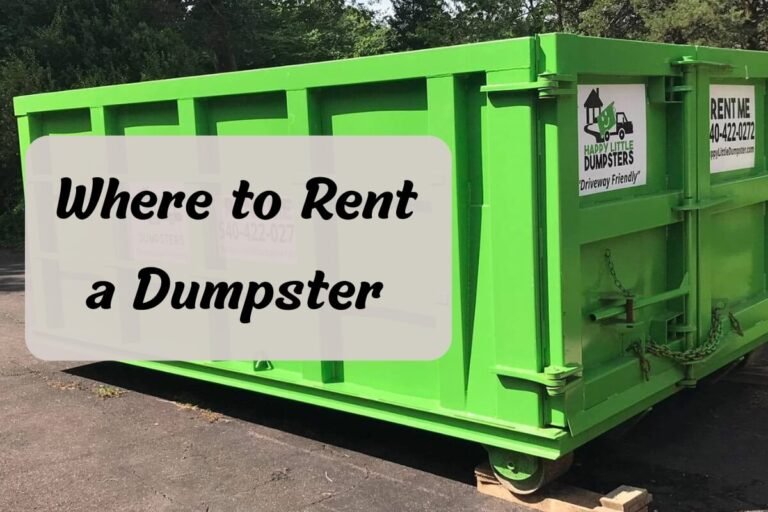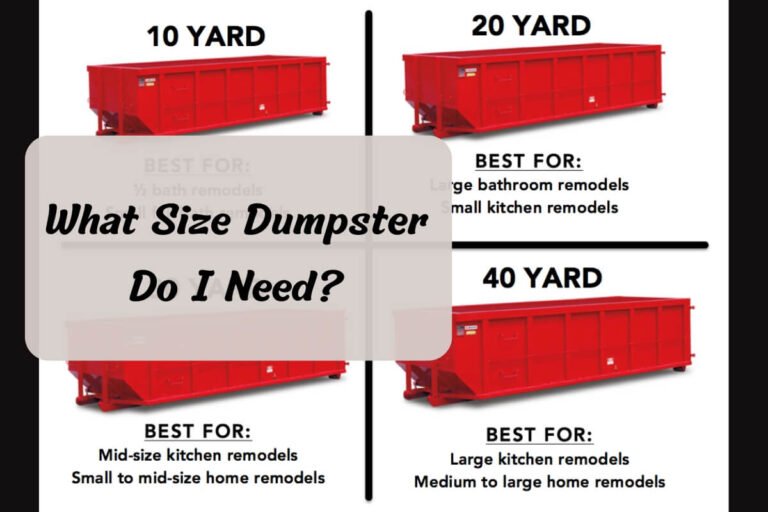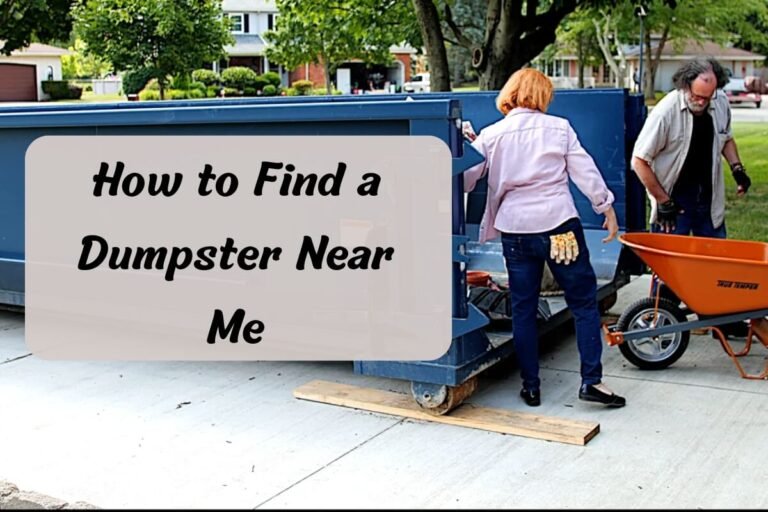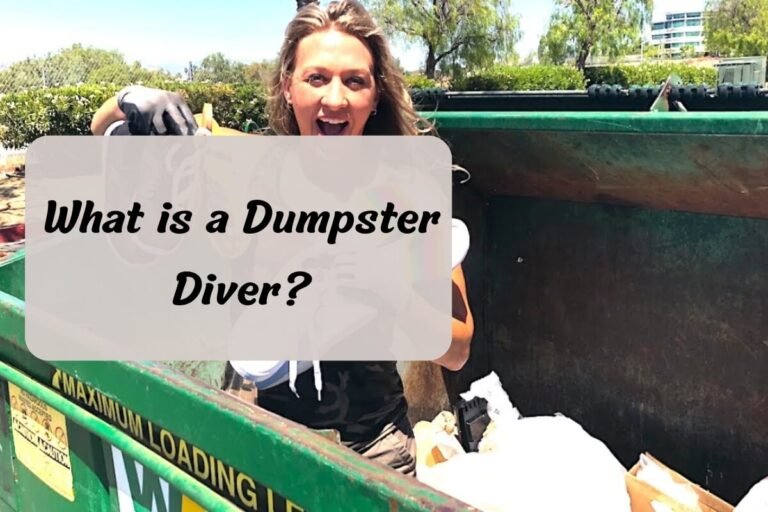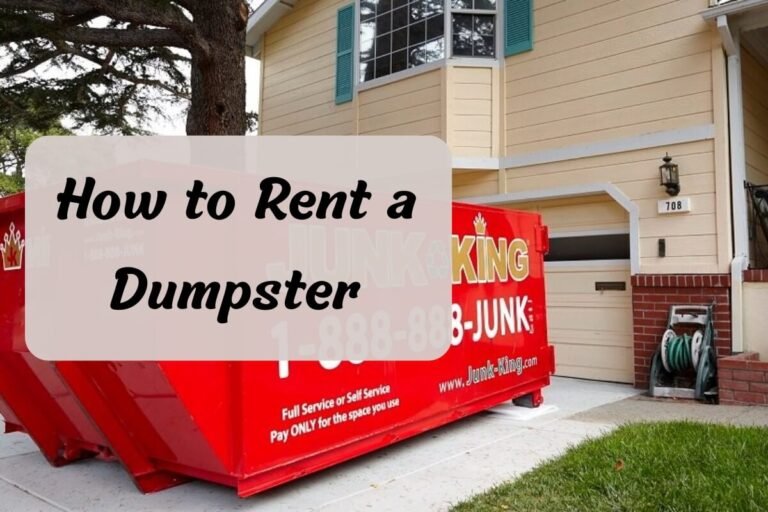What is a Roll-Off Dumpster? The Comprehensive Guide
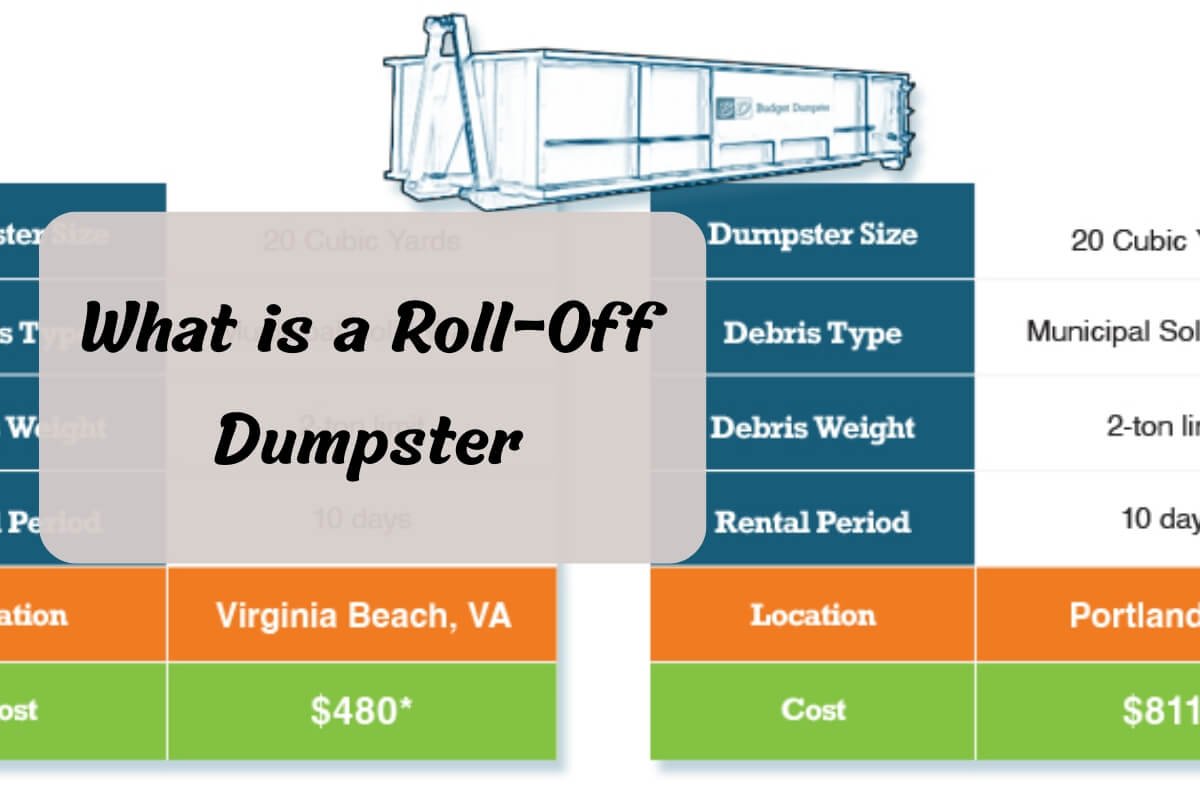
Planning a home renovation or construction? You’ll likely need a roll-off dumpster. A roll-off dumpster is a large container for disposing waste materials. Different sizes are available, suitable for various projects. The dumpster is delivered to your site, filled with debris, then hauled away. This guide explains roll-off dumpsters, helping you choose the right size and prepare for rental.
A roll-off dumpster, also known as a construction dumpster or debris box, is a large, rectangular container designed for temporary waste disposal. It’s called a “roll-off” because it can be rolled off and on a special truck for delivery and pick-up. With its open-top design and sturdy construction, a roll-off dumpster is ideal for handling bulky items, construction debris, and large volumes of waste.
In this article, we’ll cover:
- The basics of roll-off dumpsters, including their key features and how they differ from traditional dumpsters
- Common roll-off dumpster sizes and capacities, helping you choose the right one for your project
- Popular uses and applications, from construction and demolition to residential clean-outs and landscaping
- The process of renting a roll-off dumpster, including cost factors and delivery considerations
- Tips and best practices for using roll-off dumpsters safely and efficiently
- Environmental benefits and recycling opportunities with roll-off dumpsters
- Frequently asked questions about roll-off dumpster rentals
By the end of this guide, you’ll have a comprehensive understanding of roll-off dumpsters and be better equipped to make an informed decision for your waste disposal needs.
Understanding the Basics of Roll-Off Dumpsters
Definition and Purpose of Roll-Off Dumpsters
A roll-off dumpster is a large, open-top container designed for temporary waste disposal. Unlike traditional dumpsters, which are typically stationary and used for regular waste collection, roll-off dumpsters are portable and intended for one-time or short-term use.
The primary purpose of a roll-off dumpster is to provide a convenient and efficient way to collect and dispose of large volumes of waste materials, particularly those generated during construction, demolition, or major clean-up projects.
Key Features and Components of Roll-Off Dumpsters
Roll-off dumpsters are characterized by several key features:
Open-Top Design: Roll-off dumpsters have an open top, allowing for easy loading of bulky items and debris from various angles and heights.
Rectangular Shape: These dumpsters have a rectangular footprint, which maximizes the available space and makes it easier to load and unload materials.
Heavy-Duty Construction: Roll-off dumpsters are made from sturdy materials, such as steel or durable plastics, to withstand the weight and impact of heavy debris.
Wheels or Rollers: Roll-off dumpsters are equipped with wheels or rollers, which facilitate their loading and unloading from specialized roll-off trucks.
Swinging Door or Tailgate: Many roll-off dumpsters have a swinging door or tailgate at one end, providing additional access for loading and unloading materials.
How Roll-Off Dumpsters Differ from Traditional Dumpsters
While both roll-off dumpsters and traditional dumpsters are used for waste disposal, there are several key differences:
Size and Capacity: Roll-off dumpsters are significantly larger than traditional dumpsters, with capacities ranging from 10 to 40 cubic yards, compared to 2 to 8 cubic yards for traditional dumpsters.
Portability: Roll-off dumpsters are designed to be portable and can be easily transported to and from job sites using specialized roll-off trucks, while traditional dumpsters are typically stationary.
Loading Method: Traditional dumpsters are loaded from the top, while roll-off dumpsters can be loaded from the top, sides, or through a swinging door or tailgate.
Usage: Roll-off dumpsters are primarily used for temporary, large-scale projects like construction, demolition, or major clean-ups, while traditional dumpsters are used for regular waste collection from businesses or residential properties.
Rental vs. Subscription: Roll-off dumpsters are typically rented on a short-term basis, while traditional dumpsters are often provided as part of a recurring waste management service.
Sizes and Capacities of Roll-Off Dumpsters
Roll-off dumpsters come in various sizes to accommodate different project needs and waste volumes. Understanding the available sizes and their respective capacities is crucial for choosing the right dumpster for your project and avoiding overage fees or the need for multiple dumpsters.
Common Roll-Off Dumpster Sizes (10, 20, 30, 40 cubic yards)
The most common roll-off dumpster sizes are:
- 10 Cubic Yards: Suitable for small-scale projects like basement or garage clean-outs, minor renovations, or small demolition jobs.
- 20 Cubic Yards: A popular choice for medium-sized projects, such as home additions, roof replacements, or larger residential clean-ups.
- 30 Cubic Yards: Often used for major home renovations, commercial construction projects, or large-scale demolition jobs.
- 40 Cubic Yards: The largest size, ideal for extensive commercial or industrial projects, complete building demolitions, or large-scale clean-ups.
Weight Limits and Considerations
Roll-off dumpsters have weight limits, typically 5-10 tons, depending on size and local rules. Rental companies set these limits.
Exceeding the weight limit can result in additional fees or potential safety hazards during transportation. It’s essential to factor in the density and weight of the materials you plan to dispose of when selecting the appropriate dumpster size.
Choosing the Right Dumpster Size for Your Project
To choose the right roll-off dumpster size for your project, consider the following factors:
- Project Type and Scope: Larger projects, such as whole-house renovations or commercial construction, will require larger dumpsters.
- Estimated Waste Volume: Try to estimate the approximate volume of waste you’ll be generating based on the project scope and materials involved.
- Nature of Waste Materials: Heavier materials like concrete, brick, or soil may require a larger dumpster or a lower weight limit to avoid exceeding the maximum weight capacity.
- Project Duration: If your project is expected to last several weeks or months, you may need multiple dumpster deliveries or a larger dumpster to accommodate the ongoing waste generation.
If you’re unsure about the appropriate dumpster size, it’s always best to consult with a reputable roll-off dumpster rental company. They can provide guidance based on your project details and help you avoid under- or over-estimating your needs.
Popular Uses and Applications of Roll-Off Dumpsters
Roll-off dumpsters are versatile and widely used for various projects across different industries and sectors. Here are some of the most common uses and applications:
Construction and Demolition Debris Removal
One of the primary uses of roll-off dumpsters is for construction and demolition projects, where large volumes of debris, such as:
- Concrete, brick, and rubble
- Drywall and insulation
- Lumber and wood waste
- Roofing materials
- Flooring and carpeting
Having a roll-off dumpster on-site allows for efficient debris removal, keeping the job site organized and safe.
Residential Cleanouts and Renovations
Roll-off dumpsters are invaluable for residential projects like:
- Home renovations and remodeling
- Garage, attic, or basement clean-outs
- Estate cleanouts
- Landscaping and yard waste disposal
- Roof replacements
The convenience of a roll-off dumpster eliminates the need for multiple trips to the landfill or transfer station, saving time and effort.
Landscaping and Yard Waste Disposal
Landscaping projects, such as tree removals, yard clean-ups, or major landscaping overhauls, can generate significant amounts of organic waste. Roll-off dumpsters provide a convenient way to dispose of:
- Branches, stumps, and logs
- Leaves, grass clippings, and other yard debris
- Soil, rocks, and gravel
Many roll-off dumpster rental companies offer options for separating and recycling green waste, promoting eco-friendly practices.
Commercial and Industrial Projects
Roll-off dumpsters are also widely used in commercial and industrial settings for projects like:
- Office or retail space renovations
- Facility clean-outs
- Manufacturing plant clean-ups
- Equipment or machinery removal
The large capacity and portability of roll-off dumpsters make them an ideal solution for handling the significant volumes of waste generated during commercial and industrial projects. These dumpsters can accommodate a wide range of materials, including construction debris, outdated equipment, packaging materials, and more.
Renting a Roll-Off Dumpster: The Process
Renting a roll-off dumpster is generally a straightforward process, but it’s essential to understand the steps involved and the factors that can affect the cost.
How to Rent a Roll-Off Dumpster
The typical process for renting a roll-off dumpster involves the following steps:
- Determine Your Needs: Evaluate the size and type of dumpster required based on your project’s scope, waste volume, and materials.
- Research and Compare Providers: Look for reputable roll-off dumpster rental companies in your area and compare their rates, services, and reviews.
- Schedule Delivery and Pick-up: Once you’ve chosen a provider, schedule the delivery and pick-up dates for the dumpster, taking into account the project timeline.
- Prepare the Dumpster Location: Ensure you have a suitable location for the dumpster, considering factors like accessibility, surface type, and any potential obstructions.
- Load the Dumpster: Fill the dumpster with your waste materials, being mindful of any weight limits or restrictions on certain items.
- Schedule Pick-up: Contact the rental company when the dumpster is full or your project is complete to arrange for pick-up.
Factors Affecting Roll-Off Dumpster Rental Costs
The cost of renting a roll-off dumpster can vary depending on several factors, including:
- Dumpster Size: Larger dumpsters typically cost more to rent.
- Rental Duration: Longer rental periods may result in higher overall costs.
- Location: Rental rates can differ based on your geographic location and the distance the dumpster needs to travel.
- Disposal Fees: Some rental companies include disposal fees in their rates, while others charge these fees separately based on the weight or volume of waste.
- Additional Services: Extra services like same-day delivery, weekend or after-hours pick-up, or on-site relocation may incur additional charges.
To ensure you get the best value, it’s recommended to obtain quotes from multiple roll-off dumpster rental companies and inquire about any additional fees or charges that may apply.
Delivery, Placement, and Pickup Considerations
When renting a roll-off dumpster, there are a few important considerations regarding delivery, placement, and pick-up:
- Accessibility: The delivery location should be easily accessible for the roll-off truck, with sufficient clearance for maneuvering and dropping off the dumpster.
- Surface Type: Roll-off dumpsters should be placed on a flat, solid surface like concrete or asphalt to prevent sinking or damage.
- Permits: Depending on your location, you may need to obtain a permit from your local authorities to place a dumpster on public property or the street.
- Obstructions: Ensure there are no overhead obstructions, such as power lines or low-hanging branches, that could interfere with the delivery or pick-up process.
- Pick-up Scheduling: Plan ahead and schedule the pick-up date well in advance, especially during busy seasons or for larger dumpsters.
Addressing these considerations upfront ensures a smooth and hassle-free roll-off dumpster rental experience.
Tips and Best Practices for Using Roll-Off Dumpsters
To maximize the efficiency and safety of using a roll-off dumpster, it’s essential to follow best practices and adhere to any guidelines provided by the rental company.
Loading and Filling the Dumpster Properly
- Distribute Weight Evenly: Avoid piling all the heavy materials on one side of the dumpster, as this can cause instability during transportation.
- Fill from the Bottom Up: Start loading from the bottom and work your way up, packing materials tightly to maximize space.
- Break Down Large Items: Disassemble or break down bulky items like furniture or appliances to create more space and avoid overfilling the dumpster.
- Separate Recyclable Materials: If possible, separate recyclable materials like metal, wood, or concrete for proper disposal or recycling.
Prohibited Items and Waste Restrictions
Most roll-off dumpster rental companies have restrictions on the types of materials that can be discarded in their dumpsters. Common prohibited items include:
- Hazardous materials (e.g., asbestos, chemicals, paints, oils)
- Flammable or explosive materials
- Toxic or radioactive waste
- Tires and batteries
- Appliances containing refrigerants (e.g., air conditioners, refrigerators)
Know the rental company’s waste policies and follow guidelines to avoid extra fees.
Safety Guidelines and Precautions
Using a roll-off dumpster involves potential safety risks, so it’s essential to follow these guidelines:
- Secure the Dumpster: If the dumpster is placed on an incline or uneven surface, use wheel chocks or blocks to prevent it from rolling or shifting.
- Avoid Overloading: Do not exceed the dumpster’s weight limit, as this can cause instability and increase the risk of injury during transportation.
- Maintain Clear Access: Keep the area around the dumpster clear of obstructions to allow for easy access and safe loading.
- Use Proper Lifting Techniques: When loading heavy or bulky items, use proper lifting techniques to avoid strain or injury.
- Supervise Children: Keep children away from the dumpster area to prevent potential accidents or injuries.
By following these safety guidelines, you can help ensure a safe and incident-free experience when using a roll-off dumpster.
Environmental Impact and Recycling with Roll-Off Dumpsters
In addition to their practical benefits, roll-off dumpsters can also play a role in promoting sustainable waste management practices and reducing environmental impact.
Reducing Landfill Waste with Roll-Off Dumpsters
One of the primary advantages of using a roll-off dumpster is the ability to divert a significant portion of waste from landfills. By efficiently collecting and transporting large volumes of waste to appropriate processing facilities, roll-off dumpsters can facilitate:
- Recycling: Materials like metal, wood, concrete, and certain plastics can be separated and sent to recycling facilities for processing and reuse.
- Composting: Organic waste, such as yard trimmings and certain types of construction debris, can be diverted to composting facilities, reducing methane emissions from landfills.
- Waste-to-Energy: Some waste materials, like certain types of plastics and paper, can be converted into energy through waste-to-energy facilities, reducing reliance on fossil fuels.
Recycling and Diversion Opportunities
Many roll-off dumpster rental companies offer recycling and diversion services to promote sustainable waste management practices. These services may include:
- Separated Dumpsters: Providing separate dumpsters for different waste streams, such as concrete, wood, metal, and general waste, to facilitate material-specific recycling or processing.
- On-site Sorting: Some companies offer on-site sorting services, where trained personnel separate recyclable materials from the waste stream before transportation.
- Recycling Facilities: Roll-off dumpster rental companies may partner with local recycling facilities to ensure that recyclable materials are properly processed and reused.
Recycle and divert waste to reduce your project’s environmental impact and support a sustainable future.
Choosing Eco-Friendly Dumpster Rental Companies
When selecting a roll-off dumpster rental company, consider their environmental policies and practices. Look for companies that:
- Prioritize Recycling and Diversion: Choose companies that actively promote recycling and diversion programs, and have partnerships with local recycling facilities.
- Use Eco-Friendly Practices: Some companies may use alternative fuel vehicles, implement energy-efficient practices, or prioritize sustainable operations.
- Provide Recycling Education: Companies that educate their customers on proper waste sorting and recycling practices can help promote better environmental stewardship.
Choosing an eco-friendly roll-off dumpster rental company ensures your waste disposal efforts are environmentally responsible.
FAQs about Roll-Off Dumpsters
Here are some frequently asked questions about roll-off dumpsters:
What is the difference between a roll-off dumpster and a regular dumpster?
Roll-off dumpsters are larger, rectangular containers designed for temporary waste disposal during construction, renovations, or major clean-ups. Regular dumpsters are typically smaller and used for ongoing waste collection from businesses or residential properties.
How do I determine the right size roll-off dumpster for my project?
The appropriate dumpster size depends on the scope of your project and the estimated volume of waste. Rental companies can provide guidance based on your project details, but generally, a 10-yard dumpster is suitable for small projects, while larger projects may require 20, 30, or 40-yard dumpsters.
Are there any restrictions on what can be placed in a roll-off dumpster?
Yes, most rental companies have restrictions on certain types of waste, such as hazardous materials, flammable liquids, tires, batteries, and appliances containing refrigerants. It’s important to check with your rental company for their specific policies.
How long can I keep a rented roll-off dumpster?
Rental periods can vary, but most companies offer options ranging from a few days to several weeks or months, depending on your project’s timeline. Longer rental periods may incur additional fees.
Do I need a permit to have a roll-off dumpster delivered?
In some areas, you may need to obtain a permit from local authorities to place a dumpster on public property or the street. Your rental company can provide guidance on local regulations and permitting requirements.
Can I load the dumpster myself, or do I need to hire someone?
Most roll-off dumpster rentals allow you to load the dumpster yourself. However, if you need assistance with loading or unloading, some companies may offer additional labor services for an extra fee.
How much does it cost to rent a roll-off dumpster?
Rental costs can vary based on factors like dumpster size, rental duration, location, and any additional services required. It’s best to obtain quotes from multiple rental companies and inquire about any additional fees or charges that may apply.
Can I recycle materials using a roll-off dumpster?
Yes, many roll-off dumpster rental companies offer recycling and diversion services, allowing you to separate recyclable materials like metal, wood, concrete, and certain plastics for proper processing and reuse.
Conclusion
Roll-off dumpsters are invaluable tools for efficient waste disposal during construction, renovation, and major clean-up projects. By understanding their features, sizes, and applications, as well as the rental process and best practices, you can ensure a smooth and hassle-free experience.
Remember, choosing the right roll-off dumpster size, adhering to waste acceptance policies, and following safety guidelines are crucial for maximizing efficiency and minimizing potential issues. Additionally, considering eco-friendly rental companies and recycling opportunities can help reduce your project’s environmental impact.
Whether you’re tackling a residential renovation, commercial construction project, or large-scale clean-up, a roll-off dumpster can provide a convenient and cost-effective solution for managing your waste disposal needs. With the knowledge gained from this guide, you’ll be well-equipped to make an informed decision and leverage the benefits of roll-off dumpsters for your next project.


